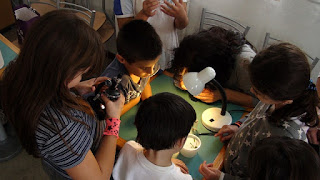Simple ways to teach kids empathy

We all want our kids to develop empathy -- that essential knack for understanding how another person feels and responding with kindness. We want our children to grow up to be thoughtful, compassionate adults who are "tuned in" to the feelings and needs of others. Fortunately, some simple, effective strategies can help empathy bloom as our children grow. Here are five strategies that busy parents can use: 1. Help your child describe his or her own feelings. Kids need to be able to label their own feelings in order to understand how others feel. "Mad," "sad," and "happy" will probably be the starting point. From there, your child can learn words like "disappointed," "surprised," "excited," "scared," "thankful," "left out," and more. So, when a child has a strong feeling, we can lay a foundation for empathy by helping our child put the feeling into words. 2. Help you...


